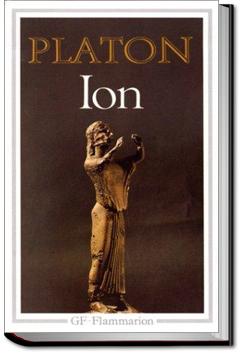UNLIMITED Audiobooks and eBooks
Over 40,000 books & works on all major devices
Get ALL YOU CAN for FREE for 30 days!
Ion
Plato
Book Overview:
In Plato’s Ion, Socrates questions Ion on whether he should really claim laud and glory for his ‘rhapsodic’ recitals of Homer’s poetry.
In Plato’s Ion, Socrates questions Ion on whether he should really claim laud and glory for his ‘rhapsodic’ recitals of Homer’s poetry.
How does All You Can Books work?
All You Can Books gives you UNLIMITED access to over 40,000 Audiobooks, eBooks, and Foreign Language courses. Download as many audiobooks, ebooks, language audio courses, and language e-workbooks as you want during the FREE trial and it's all yours to keep even if you cancel during the FREE trial. The service works on any major device including computers, smartphones, music players, e-readers, and tablets. You can try the service for FREE for 30 days then it's just $19.99 per month after that. So for the price everyone else charges for just 1 book, we offer you UNLIMITED audio books, e-books and language courses to download and enjoy as you please. No restrictions.
In the Protagoras the ancient poets are recognized by Protagoras himself as the original sophists; and this family resemblance may be traced in the Ion. The rhapsode belo. . . Read More
Try now for FREE!

"Love your service - thanks so much for what you do!"
- Customer Cathryn Mazer
"I did not realize that you would have so many audio books I would enjoy"
- Customer Sharon Morrison
"For all my fellow Audio Book & E-Book regulars:
This is about as close to nirvana as I have found!"
- Twitter post from @bobbyekat



Community Reviews
donc Socrate en plus d'être le Mec Chiant par excellence ne comprend strictement rien à la poésie
Jedan od najkraćih Platonovih dijaloga, čitao sam prevod koji kod nas nozi naziv "O Ilijadi". Nije baš o tome, ali ok, jeste na temu poezije (i umetnosti generalno). Kako poezija nastaje i da li može biti "znanje"?
Volim Platona, najviše sam ga i čitao od filozofije. Prava je vežba za um, često iznen
Of what use are poets?
13 September 2019
So, this is one of Plato’s earlier dialogues and records a conversation that Socrates has with a rhapsody. Now, when we are talking about rhapsodies, we aren’t talking about one from Bohemia, but rather a class of poets in Ancient Greece who pretty much only ev
I loved this dialogue because it centers on a question that preoccupies me often ‘where does the inspiration/passion of the artist come from?’ Incredibly short compared to other dialogues. Ion reminds me of so many people I know.
This lovely little dialogue, one of Plato’s shortest works, involves Socrates and the rhapsode, Ion. Ion is a rhapsode, which means that he recites, embellishes, and interprets poetry. In Ion’s case he is specialized in Homer, and admits that he knows nothing about any other poet. Socrates pounces u
Ion is a very short Platonic dialogue between Socrates and a rhapsode by the name of Ion who specializes in reciting the poetry of Homer. The dialogue explores the nature of poetic and artistic inspiration in a most playful way. If you are interested in literature and the arts, you will really enjoy
[A concourse in Athens. ION, SOCRATES, a PASSER-BY]
ION : Hi Socrates.
SOCRATES : What, you again? After the comprehensive verbal trouncing you received yesterday?
ION: Yeah, well, like I’ve thought about it some more. Wanna try a re-run?
SOCRATES: If that is what you wish. Where shall we start?
ION: Oka